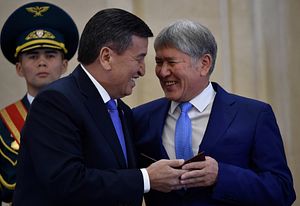On May 25, former Kyrgyz President Almazbek Atambayev suspended his membership, also thus ceding his role as chairman, of the Social Democratic Party of Kyrgyzstan (SDPK). The trigger for Atambayev’s withdrawal from the party was the pending adoption, set for May 27, of a raft of amendments to the country’s Law On Guarantees of the President’s Activities, which effectively force a choice: a person can either be an ex-president or an active politician, but not both.
Earlier in May, President Sooronbay Jeenbkov ratified legislation that has been creeping toward completion for nearly a year. As we’ve watched here at The Diplomat, the relationship between Jeenbekov and his predecessor, a slow burning of ties between former allies, has been illustrated through waves of dismissals of Atambayev-era officials, charges leveled against a handful of those former officials, and an apparent split in the party the two once shared.
In a quirk of the Kyrgyz political system, although presidential candidates are nominated by parties and supported in their quest for office by parties, they suspend membership upon acceding to the office of president. Ostensibly, this is to draw a hard line between the muck of politicking and the duty of serving all Kyrgyz citizen.
But that line is a pleasant fiction.
Immediately after Atambayev stepped down from the presidency after serving his constitutionally mandated single six-year term, he returned to SDPK. Although he’d earlier pledged to retire from politics, in Atambayev’s final presidential press conference — about a month after the October election saw Jeenbekov victorious — he said he didn’t want to become parliament speaker or a lawmaker “right away,” but that he planned to lead SDPK in the next parliamentary election, set for 2020.
Although Atambayev heartily backed Jeenbekov during the campaign, the falling out between the two began soon after. In March 2019, Atambayev went so far as to apologize publicly for helping Jeenbekov into power.
Jeenbekov’s supporters and other in the Kyrgyz parliament have called for Atambayev to be investigated. Last summer, the Constitutional Chamber of Kyrgyzstan’s Supreme Court accepted a petition to evaluate the constitutionality of presidential immunity. They ultimately ruled the provision of immunity unconstitutional, but said legal changes would have to be made by parliament. Of Kyrgyzstan’s four presidents since independence, only two actually enjoyed immunity — Roza Otunbayeva and Almazbek Atambayev. Both Askar Akayev and Kurmanbek Bakiyev were stripped of their ex-presidential immunity.
The recent legal changes do not remove presidential immunity entirely, but do provide a pathway to do so. As noted above, two previous Kyrgyz presidents have been stripped of immunity but arguably those are special cases; both had been overthrown in popular revolutions and subsequently fled the country. What’s new here is a set process and a choice.
As RFE/RL summarized, “The new law preserves immunity from prosecution for former presidents, but also states that prosecution is possible if they lose their formal status as an ex-president.” That status can be stripped if they are suspected of “especially serious crimes,” though that category is left undefined. Other sources, like 24.kg and Vestnik Kavkaza, note that within the amendments are stipulations that if a former president remains actively engaged in politics, they are not entitled to presidential (or ex-presidential) privileges, including immunity.
The underlying threat is that ex-presidents have a choice: Stay out of politics or lose the privilege of being an ex-president. Alternatively, even if an ex-president stays out of politics, they can still be brought to answer for crimes committed during their term of office.
The weakening of presidential immunity may not be a terrible idea in abstract and especially not if applied universally. The problem at present is that the current repackaging of presidential privileges is clearly targeted at Atambayev. Furthermore, Atambayev may have ceded formal membership in SDPK, for now, but arguably he could still influence the party unofficially. In a sense, this pushes politics further into the shadows rather than shedding light.
Still, measures that allow the state to hold those who have held the state’s highest office accountable may be good, but the present motivation matters too. Jeenbekov will be (or rather, should be) subject to these same laws when his term ends. He ought to turn attention to making sure his administration doesn’t make the same kinds of choices his predecessor allegedly made, or by 2024 we may be having this same conversation again.

































